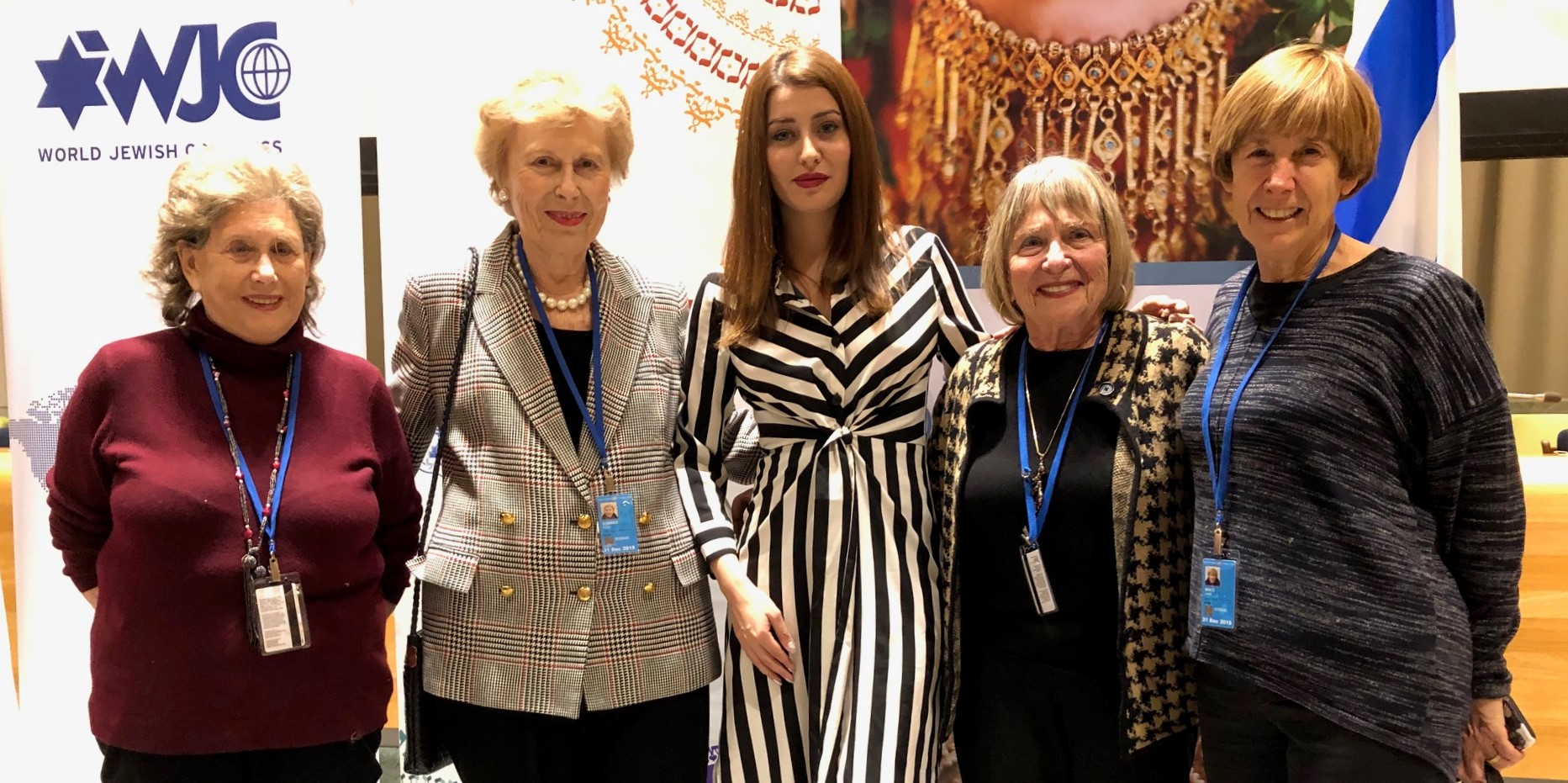Israel Seeks UN Recognition of Jewish Refugees from Arab Countries
ICJW representatives attended an event on December 4, 2019, to commemorate Jewish Refugees from North Africa and the Middle East. The event was sponsored by the Permanent Mission of Israel to the UN, JIMENA (Jews Indigenous to the Middle East and North Africa), WJC (World Jewish Congress), Conference of Presidents of Major American Jewish Organizations, Justice for Jews from Arab Countries, and the American Sephardi Federation.
November 30th has been designated by the government of Israel as the official day to commemorate the history of the Jewish communities of the Middle East and North Africa and their plight as they were persecuted and forcibly expelled from their countries beginning in 1948. Approximately 850,000 Jewish refugees fled their homes, businesses, schools, synagogues, and their entire culture, nurtured over 2500 years. The program, held in UN Headquarters in New York created awareness of this issue and emphasized our responsibility to remember what happened to these Jews as they became refugees. It is important to note that many country representatives were in attendance.
H. E. Danny Danon, Permanent Representative of Israel to the United Nations
Ambassador Danon began his talk by referring to the prior day’s discussion of Palestinian refugees in the General Assembly. Today, he said, we speak of Jewish refugees. He referred, of course, to the 850,000 Jews who were compelled to flee their homelands and their cultures in the Arab world immediately after the declaration of the state of Israel. In the days leading up to 1948, there were over one million Jews living in Arab states and Iran. Today there are just 10s of thousands. The Jews were driven out by violence, incitement, pogroms and anti- Semitism which all grew enormously as soon as the idea of a Jewish state arose in the aftermath of the Holocaust in World War II. The escaping Jews left behind all of their possessions and 2500 years of culture and traditions which were unique to the world.
An anti-Semitic historic injustice is done when Jewish refugees from Arab Lands are not considered at the UN. Ambassador Danon outlined his plans for placing the issue on the UN’s agenda by introducing a new resolution in the General Assembly. Israel’s resolution will reaffirm the Jewish refugees place in history and assure that their rights are recognized. He added, “I can see no legitimate reason for any member state to oppose the resolution.”
Elan Carr, US Special Envoy to Monitor and Combat Anti-Semitism
Carr, an Iraqi Jew, shared his family story. It began in a country where for 2500 years there was a thriving Jewish presence that flourished under Muslim and Babylonian rule. This all changed in 1948 when his father was arrested, charged as a Zionist, and sent to prison. In 1952 he encouraged the family to flee to Iran and eventually to Israel. Theirs was a typical experience of forced expulsion.
He went on to explain that he thinks that this is a moment of change in the Middle East. “One tale” includes anti-Semitism and the BDS (Boycott, Divestment, Sanctions) Movement and the “other tale” is more optimistic describing a future of tolerance and respect. He believes strongly that anti-Semitism must be fought. He stated that, in order to fight anti-Semitism, it must be understood that anti-Zionism is anti-Semitism and that Jew hatred must be confronted. He ended on a positive note and sees a future of tolerance in which Jews and Muslims will once again have a constructive relationship.
Sarah Idan, Human Rights Activist and former Miss Iraq
The third speaker was Sarah Idan, former Miss Iraq who represented her country at the 2017 Miss Universe contest. She and her family were forced to leave Iraq and her citizenship was taken away after a selfie of Miss Iraq with Miss Israel was shared on social media. She then decided to become an activist and committed herself to promoting friendship between Jews and Arabs.
Iraq was, in the past, not a Muslim country but rather, as the so-called cradle of civilization, a tolerant nation which always defended its minority populations. Unfortunately, this is no longer the case. Anti- Semitism is rampant in the country as a result of the anti-Semitic belief system being taught.
But, she said, Iraq can not erase almost three thousand years of Jewish presence in the country. Ms. Idan mentioned her trip to Israel, where she visited the Jewish Babylonian Museum and found many examples of Jewish contribution to Iraq ( (art, music, and so on). Iraq was definitely the cradle of civilization and it should be always remembered so.
She met with a number of Iraqi Jews, who showed her their Iraqi passport, with a no return visa. “It actually felt weird”, she said, “The people look like my people.” She is not only committed to promoting friendship between Jews and Arabs, but also to fight anti-Zionism and anti-Semitism.
Pictured from left to right are Sara Winkowski, ICJW; Evelyn Sommer, Chair, WJC North America; Sarah Idan, former Miss Iraq; Joan Lurie Goldberg, ICJW; and Judy Mintz, ICJW.
